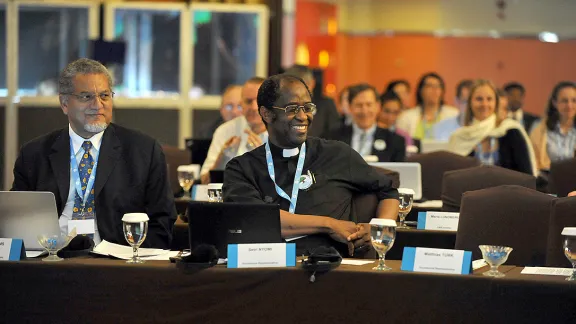
Bishop Ivan Abrahams, WMC general secretary (left), and Rev. Dr Setri Nyomi, WCRC general secretary. Photo: LWF/M. Renaux
Council Hears Ecumenical Partners
(LWI) – Ecumenical guests to The Lutheran World Federation (LWF) Council meeting at Medan, Indonesia, 12-17 June, thanked LWF for its determination to share the gift of friendship and work alongside sister churches to sustain suffering communities and the earth.
Reflecting on the theme of the Council gathering, “Like a Tree Planted by Streams of Water” (Psalm 1: 3), Rev. Gani Wiyono of the Assemblies of God noted that the ecumenical tree between the LWF and Pentecostals is ready to bear fruit.
“Thank you … for your determination to reach out to sisters and brothers of other Christian churches so that God may be praised and people may be blessed,” Wiyono said.
Monsignor Dr Matthias Tuerk of the Pontifical Council for Promoting Christian Unity recounted the almost 50 years of “astounding progress” in ecumenical relations, emphasizing that ecumenism is more than an exchange of ideas, it is a sharing of gifts.
“The notion of an exchange of gifts is an exciting one for ecumenists, for it enables previously intractable issues to take on a new and positive aspect,” Tuerk said.
The Vatican official emphasized that ecumenical relations have moved from a place of ignorance and prejudice to a point where there is a sense of a Christian family, and pointed to Lutheran-Roman Catholic relations to illustrate his point.
“On themes such as justification, the relationship between Scripture and Tradition, the nature of the Church and the sacraments, the ability to overcome historic and painful disagreements has been remarkable,” Tuerk said.
While there are differences between Lutherans and Roman Catholics, the Vatican official added that the goal of his church’s ecumenical activities is full and visible communion with other churches.
However, he cautioned: “Both of us, Catholics and Lutherans alike, are in need of constant renewal. The path to full communion is not a one-way movement. All parts must move. All parts are in need of repentance and renewal.”
For her part, Rev. Dr Henriette Hutabarat Lebang, General Secretary of the Christian Conference of Asia, the theme (“Like a Tree Planted by Streams of Water”) was an inspiring choice for a meeting held in Asia, where forests are being razed and rivers polluted in the name of profit.
“We are called by God the Creator, the Redeemer and the Sustainer to revive the genuine images of the Tree and Streams of Water that nourish life,” Lebang said.
With Asia’s growing poverty, inadequate healthcare, human trafficking, environmental degradation, climate change and communal violence, the church is called to be like a tree planted by streams of water, she added.
“In the midst of mounting threats to life, peace and justice for all, we need to work closely together, more than ever before,” Lebang urged.
Rev. Dr Setri Nyomi, General Secretary of the World Communion of Reformed Churches (WCRC), highlighted the fact that millions of people who rely on parched lands for their sustenance are yearning for something different.
“We can dare to be different and be like the tree planted by streams of water – bringing life where death reigns, bringing justice, renewal and hope to replace the injustice, brokenness and despair,” Nyomi said.
The WCRC general secretary said he was thankful for the strong relationship between Lutherans and Reformed Protestants, who pray that the two groups continue to find new ways to strengthen the bond between them.
World Methodist Council General Secretary Bishop Ivan M. Abrahams, said the theme was timely and challenging, and one that Methodists embrace. “Like you, Methodists are passionately committed to eco-justice and the care of creation.”
In marking the 15th anniversary this year of the Joint Declaration on the Doctrine of Justification signed by Lutherans and Roman Catholics in 1999, and affirmed by Methodists in 2006, Abrahams said that he hopes the declaration will lead to concrete witnessing together and visible unity of the Church.
He urged the Council not just to talk about what the LWF has accomplished in the past but to tell the story of what God is doing in their midst today. “The golden age of the Lutheran Church does not lie behind you, but ahead, as you tackle the challenges of the 21st century,” Abrahams concluded.
Council 2014 News | Council 2014 Blog | Council 2014 Documents | Council 2014 Photos


